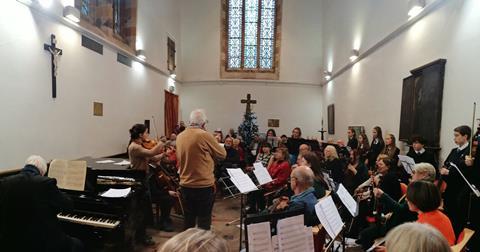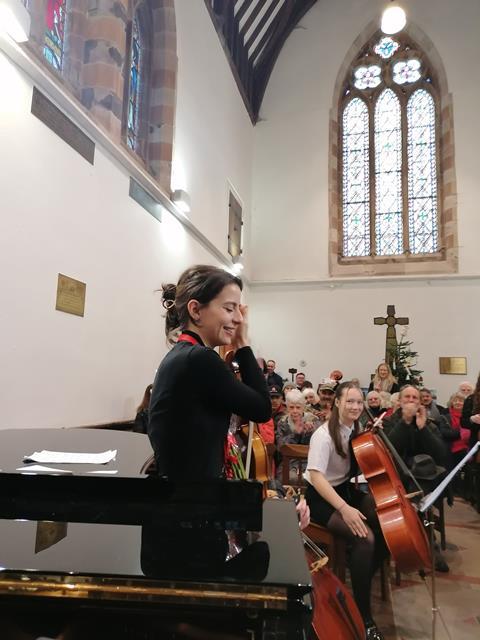In 2024, Arianna Ranieri spearheaded an initiative to provide accessible music tuition for adult learners in rural Scotland. She shares her approach that has united a community through a love of music making

Discover more Featured Stories like this in The Strad Playing Hub
‘You’ve left a legacy on this island, you’ve changed lives’
When I began my PhD research project, ‘CIMSRS: Community Instrumental Music Service for Rural Scotland’ in Millport, Isle of Cumbrae in autumn of 2024, I never expected to have eyes full of tears at the end or be told that I changed lives. My research question asks what the impact is of providing accessible (upper strings) music tuition for adults in rural Scotland, who are often excluded based on age and geographic barriers. I thought this would likely have a positive impact (although I didn’t know what kind) and that a handful of participants would be interested. I couldn’t believe what happened.
After handing out flyers on the isle and posting to online bulletins, 20 islanders got in touch, and I needed to seek out more instruments. When locals joined our jam sessions, it became a part of the isle. When I was away, the participants had their own sessions, becoming ‘The Bothy Bowers’. Near the end of the twelve-week session, funding was offered by the Cumbrae Forum to continue workshops. It was a teacher and researcher’s dream.
During my time in Millport, I saw a new sense of belonging among the participants emerge, new connections and friendships between perfect strangers, a music foundation being built, feelings of great accomplishment, and the wonder of making music, which for many, was the first time. Understandably, it is common for adults to lose motivation and inspiration when learning and instrument, due to varying factors: family life, work stress, not enough practice time, and frustration becoming burdensome. So how did these musicians stay motivated and create a music community of their very own? Especially since most of them were new to playing and were all at very different stages in adulthood.
How did these musicians stay motivated and create a music community of their very own?
Here is what I discovered:
Firstly, the learning set up was a major factor according to participants. Group lessons were much more practical, engaging, and felt safer, where mistakes could be made without judgement, and friendships were formed from experiencing this learning together. Many shared one-on-one lessons felt risky, not only financially because of travel costs (the ferry, the train or bus to Glasgow from Largs) plus the lesson fee, instrument, materials and timewise, but also emotionally. It can be stressful and daunting to be an adult beginner—there was a shared feeling of vulnerability. Even signing up for this project, some said that they were anxious to begin.
‘Getting through that confidence barrier is a big one. After the first class, I was actually walking through that room with a big, cheesy grin on my face and I was like, why is my jaw so sore? I am quite shy, but being in the group helped, I wasn’t alone. I just felt taller last week. I said ”go me!”. I just loved it.’
Participants also shared how the chosen style of teaching was motivating for them. My teaching philosophy is underpinned by being human. This sounds perhaps obvious, or silly: of course you should be human, kind, and empathetic. But for me, being human in teaching or having a humanising pedagogy, means learning about who you are teaching, what is important to them and their experiences, creating an environment where learning can thrive and grow, each person can having a sense of agency in their learning, all which contributes to sustainability for future music making, as it motivates from a healthy starting point.
They expressed (my face turned pink as I wrote this) that my enthusiasm was key, particularly: being positive and finding something good even when mistakes occurred (because there is always something that is done well—always!); never shaming (that does not achieve anything); there was a solid structure with lots of recaps and steady progression, yet left room for exploring; constantly praising; finding obstacles ‘curious’ and exploring them together as a group; celebrating victories (even small ones!); and understanding that sometimes life will get in the way of practice and attendance (as this should not be an additional barrier).
This project would not be sustainable if it did not make room for life to happen. Reflecting on who I am, and the chaos of my life as a wife, new mother, teacher, PhD student, daughter, friend, there are many times where the sonata I am chipping away at, is put on hold. So why would I project a different standard on them?
My teaching philosophy is underpinned by being human

One participant shared: ‘If you can inspire people, if you can engage people, if you can make people feel comfortable… you’re doing that, that’s why everybody’s enjoying it, and everyone feels in a safe environment. You’ve created that kind of group dynamic where we all feel quite supported by you, and by each other. You’re taking us in small steps, doable steps. Before starting, I was thinking, ”Gosh, if I miss a couple sessions, I’m never going to be able to catch up,” but you recap, and you give time to catch up with others and I feel supported by others in the group. So, I think it’s style of teaching, it’s how the content’s broken up. But I’d really do think it’s about relationships. I think if you get the relationships right then we’re all confident in sharing our anxieties and our successes. I would say you’ve got it spot on.’
Providing various kinds of repertoire and being creative while teaching the basics also proved to be important. We learnt from various genres of music, including classical, rock, American fiddle, traditional Scottish, and pop, so that everyone felt there was something they could enjoy, and having parts written that even new starts could play from the first lesson, and in the jam session (like pizzicato on open strings!). The basics could be taught even with popular melodies, like ‘Ode to Joy’, in numerous ways. We even played this theme in our concert, which provided a goal.
An important part of teaching is creating these opportunities. We had a wholesome, beautiful concert at the end of the session at Cathedral of the Isles in Millport, which was filled by the community, in collaboration with Ronan Watson (North Ayrshire Music Service) and Largs Academy, who generously loaned instruments for the project and made it possible. This was a Christmas ‘Jam’ Concert, the structure was open, and others could join in, regardless of instrument. This influenced the project’s sustainability for the future, by collaborating with other musicians in the community.
In our jam sessions that followed the classes, members of the community joined in, vamping and improvising on cornet, violin, flute, and piano. This eased fears, because it was not an elitist, hoity-toity ensemble concert with the pressure of ‘perfection’. It was a welcoming environment that celebrated music making, reassuring players, most of whom were performing for the first time. This also gave the participants something to practice for, and gave the practice sessions they had, whether alone or together, a game plan. This even instilled the confidence to perform alongside the well-established and impressive Sonoro Cumbrae Choir for their Christmas concert, directed by Rhona Gourley.
With this, many participants were moved emotionally, motivated and inspired by the phenomenon that makes music the universal language: the glory of playing with others and creating something together. Some shared that it was something they never envisioned for themselves, it was ‘surreal’ being a part of something bigger.
One participant shared: ‘When you’re a part of a group and you’re playing and you’re all playing the same thing, you feel not just connected to the music, but connected to everyone around you because we are all so in sync in that moment for hitting the right note, which is really, it’s quite a nice, like a euphoric experience almost,’.
Music really does bring communities together. This project grew from smiles in classes to a proud group of musicians, who are dedicated, unbelievably keen, and also brilliant players. Although it has only been twelve weeks, their dedication and practice allowed them to play pieces with multiple parts, and for the new starts, playing with all the fingers on all the strings in first position (and in tune!), which is a major achievement.
Some shared in group discussions that before the project, they felt their demographic (adults, especially in rural areas) were forgotten about, or they did not feel they were the ‘type’ to have the chance to learn the violin or viola at school; or that at their time, whether in the last decade or five, that it was seen as ‘very middle-class’; or it was just not an option, for various reasons. This goes to show that it is never too late, and anyone who wants to learn, can achieve.
While it was an emotional, wonderful, end to the session I had in Millport, I am thrilled to return for workshops to keep the music going and continuing my research, thanks to the Cumbrae Forum and Ronan Watson with North Ayrshire IMS. Next, I am in Auchtermuchty (Fife) followed by Glencoe (Highlands) in the summer of 2025.
As for the future of The Bothy Bowers, it is bright! They have appointed an admin lead from the group and formed a regular meeting schedule to keep each other motivated, practising in The Garrison House, in Millport, to accommodate a growing group. They meet a few times during the week, in collaboration with other musicians on the island, of varying instrument disciplines, and work on the pieces from our monthly workshops, among other music they’re exploring with others.
Congratulations to The Bothy Bowers of Millport, may the journey long continue!
Read: The healing power of the cello: four adult learners share their stories of overcoming adversity
Read: Bryony Gibson-Cornish: How I acquired my dream Amati viola
Discover more Featured Stories like this in The Strad Playing Hub
The number one source for playing and teaching books, guides, CDs, calendars and back issues of the magazine.
In The Best of Technique you’ll discover the top playing tips of the world’s leading string players and teachers. It’s packed full of exercises for students, plus examples from the standard repertoire to show you how to integrate the technique into your playing.
The Strad’s Masterclass series brings together the finest string players with some of the greatest string works ever written. Always one of our most popular sections, Masterclass has been an invaluable aid to aspiring soloists, chamber musicians and string teachers since the 1990s.
The Canada Council of the Arts’ Musical Instrument Bank is 40 years old in 2025. This year’s calendar celebrates some its treasures, including four instruments by Antonio Stradivari and priceless works by Montagnana, Gagliano, Pressenda and David Tecchler.













































No comments yet